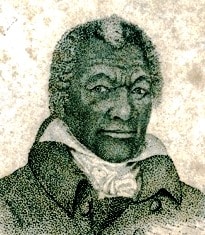James Armistead Lafayette was an enslaved African American who served the Continental Army during the American Revolutionary War under the Marquis de Lafayette. As a double agent, he was responsible for reporting the activities of Benedict Arnold – after he had defected to the British – and of Lord Cornwallis during the run-up to the Battle of Yorktown. He fed the British false information while disclosing very accurate and detailed accounts to the Americans.

American Revolution
James Armistead Lafayette was the property of the slaveowner William Armistead. When the Revolution broke out, he asked his owner if he could enlist in the Continental Army, which his owner allowed. When he arrived in the camp of Marquis de Lafayette, he was given a different sort of mission.
The Marquis was passionately against slavery, but he knew how to use the current climate to his advantage. He had James pose as a runaway slave and be absorbed into the British Army.
Once he was absorbed, he became a double agent and worked directly under Benedict Arnold. He became a trusted person for the turncoat General but never switched loyalties. Throughout the rest of the war, he fed Arnold false information and gave Americans accurate information.
The information Armistead leaked to the Americans was highly effective at the Battle of Yorktown and aided their victory.
Post-Revolution
Although Virginia passed a manumission act in 1782 allowing for the freedom of any slave by his or her owner, James Armistead remained the property of William Armistead. This was because a 1783 law specifically only freed slaves whose owners had used them as substitutes for army service in exchange for their liberty.
This was not the case for Armistead due to being a spy and not a soldier. However, in 1786, with the support of William Armistead – then a member of the House of Delegates – and a 1784 testimonial of James Armistead Lafayette's service from the Marquis de Lafayette, James petitioned the Virginia Assembly for his freedom. On January 9, 1787, the Assembly granted the petition. At that time, he chose to add "Lafayette" to his name to honor the general.
Marquis de Lafayette Tours America
The Marquis de Lafayette never forgot the sacrifice of the former slave and always had much affectionate for him. When he returned to America, he was given rockstar treatment and drew a large crowd wherever he spoke.
While in Virginia, he visited George Washington's grave and made a speech to the House of Delegates. During one of his trips, he recognized James Armistead Lafayette in the crowd, rushed from his carriage to the former slave, and embraced him.
Both men played a role in benefiting each other. Armistead was emancipated because of Marquis de Lafayette's testimony, and the Marquis had become popular in America due to the success that Armistead helped create. The Marquis never forgot his bravery.
Death
Armistead Lafayette continued to live in New Kent County with his new wife, one son, and several other children and became a rich farmer. In 1818, he applied to the state legislature for financial aid; he was granted $60 for present relief and a $40 annual pension for his services in the Revolutionary War.
When he died, is a bit muddled. He either died in Baltimore in 1830 or in Virginia in 1832.
